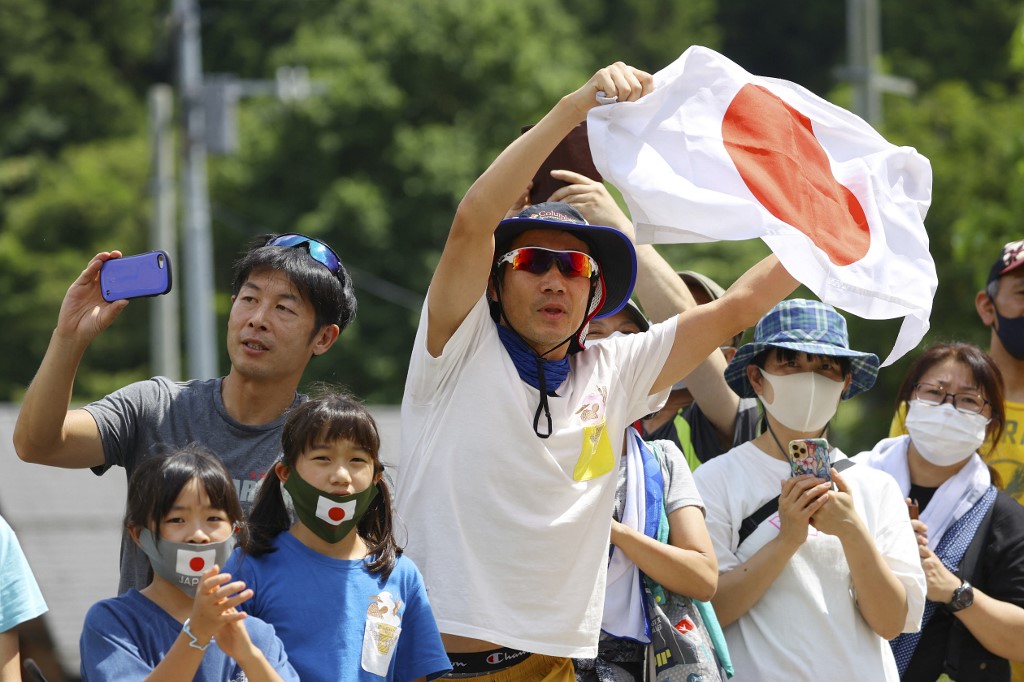
Fans watch cyclist (unseen) ride during the men’s cycling road race of the Tokyo 2020 Olympic Games finishing at the Fuji International Speedway in Oyama, Japan, on July 24, 2021. (Photo by Tim de Waele / POOL / AFP)
After months of opposition, some in Japan are warming to the pandemic-hit Olympics, with fans defying authorities to cheer athletes on public roads and rushing to snap up Games merchandise.
It hasn’t hurt that Japan’s athletes have enjoyed a gold rush in the first four days of the Games, triumphing in sports from judo to skateboarding to top the medals table with 10 golds ahead of the United States and China.
Fans are barred from almost all events over virus fears, and have been asked to stay away from competitions on public roads.
But they’ve been showing up anyway, determined for a glimpse of Olympic action.
“If you see these athletes running in front of you, you can’t help but cheer for them,” said 42-year-old Hirochika Takeda, who popped out of his apartment to see the women’s triathlon passing by in the rain.
“I had questions about holding the Olympics right up until the opening ceremony,” the IT professional said.
“But once the sport began, I started to feel that maybe this is a good thing.”
The Games opened on Friday, with tens of thousands of athletes, officials and media arriving in Japan from around the world.
Because of the virus, the Olympics are taking place under a state of emergency in Tokyo that means fans are barred from venues and there is high anxiety about rising infections.
But when the opening ceremony rolled around on Friday, thousands of people crowded around the Olympic Stadium to soak in the atmosphere and see the fireworks from outside, far outnumbering a group of anti-Games protesters.
‘Explosively busy’
Fans take a selfie in front of the Olympic Rings outside the Olympic Stadium ahead of the opening ceremony of the Tokyo 2020 Olympic Games, in Tokyo, on July 23, 2021. (Photo by Philip FONG / AFP)
And those at home were equally intrigued, with viewing figures showing over 50 percent of households in Tokyo watched the ceremony live on TV.
There has also been a surge in demand for Tokyo 2020 trinkets, according to shopowners and organizers.
“Stores have become explosively busy,” said Hikari Iinuma, of Tokyo 2020’s licensing department.
Stores set up specifically to sell Tokyo Olympic items that had shut down for lack of customers are now reopening, she said.
“The trend is very clear in Tokyo,” added Iinuma, who declined to give figures on sales, but said popular items included T-shirts, mugs and towels.
It might be no coincidence that the change of heart has coincided with a winning streak for home athletes.
Japan’s gold medalists include 13-year-old skateboarder Momiji Nishiya, brother-and-sister judokas Hifumi and Uta Abe and table tennis pair Jun Mizutani and Mima Ito.
Yuji Ishizaka, a sports sociologist at Nara Women’s University, said the post-victory comments from Japanese athletes might be helping to soften opposition to the Games.
“Rather than bursts of raw emotions, they are… voicing their appreciation for this opportunity,” he told AFP.
“What we are seeing is restrained enthusiasm,” Ishizaka said.
‘Happy to see them’
Fans watch the women’s individual triathlon competition during the Tokyo 2020 Olympic Games at the Odaiba Marine Park in Tokyo on July 27, 2021. (Photo by Kazuhiro NOGI / AFP)
The change of heart is not universal, and many people are still worried about virus risks.
A poll in the Nikkei newspaper published Monday found 31 percent still believed the Games should have been postponed or canceled, though nearly 70 percent backed holding it in some form.
“I feel people are forgetting the coronavirus,” said Chintan Makwana, an Indian resident of Tokyo who said he was unnerved by the crowds in his neighborhood watching events.
“For those of us who live here, it is scary,” the software engineer said.
On Tuesday, Tokyo reported a record 2,848 new daily virus cases. The figure may include cases that were not reported over the long weekend, but infections were already rising.
In Tokyo’s Odaiba area, hundreds of people defied authorities and the rain to cheer competitors in the women’s triathlon on Tuesday.
Nearly all wore masks and restricted themselves to clapping, and those who did shout stood a distance from others.
“Ganbatte, ganbatte (go, go),” cheered Atsuko Kawata, a retiree from a nearby neighborhood as the athletes ran past.
“I don’t know anything about this sport, but I’m happy to see them. I’m going to brag about this to my kids,” she added cheerfully.
“All kinds of things were said about the Olympics, but I wanted to support these athletes.”